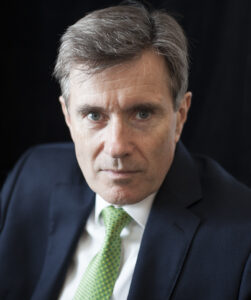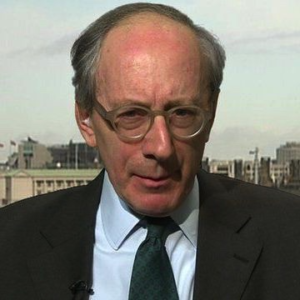On Tuesday 19th November, we were delighted to welcome Sir John Sawers GCMG, Chief of MI6 (2009-2014) and Executive Chairman of Newbridge Advisory, back to GSF to speak on the topic of ‘Can A Divided America Stand: After The US Election, What Next For Global Politics?’.
GSF Advisory Board member, the Rt Hon Sir Malcolm Rifkind KC chaired the event, which we held in memory of and in tribute to Lord Lothian, GSF’s co-founder and Chairman.
The text of Sir John’s remarks are available here. The recording of the event is available on our YouTube channel. Click here for the link.
______________________________________________
SPEAKER BIOGRAPHIES
 SIR JOHN SAWERS GCMG has spent his career dealing with foreign policy and international security. After several years in the intelligence service, MI6, Sir John worked as a diplomat in the Middle East, Africa and the United States. He was foreign policy adviser to Prime Minister Tony Blair and went on to be Ambassador to Egypt, Political Director in the Foreign Office and UK Ambassador to the United Nations in New York. In 2009, he was called back to London to become Chief of MI6, a position he held for five years. As MI6 Chief, he took part in the UK National Security Council and the Joint Intelligence Committee, contributing to the strategies and policy decisions on how to promote and protect British interests around the World. He led MI6 through a period of international political upheaval and high terrorist threat, including against the 2012 London Olympics. He also modernised the way the Service works and created a more open approach to public accountability. Since leaving public service, Sir John has advised private sector leaders on geopolitics and political risk. In 2019, he set up his own company, Newbridge Advisory. He was also a Non-Executive Director of BP from 2015 to 2024. Sir John studied at the universities of Nottingham, St Andrews and Harvard. In addition to his corporate work, he has pro bono roles with King’s College London, Nottingham University, the Council on Foreign Relations, Chatham House, the European Council on Foreign Relations, the Royal United Services Institute, the Bilderberg Association and the Ditchley Foundation.
SIR JOHN SAWERS GCMG has spent his career dealing with foreign policy and international security. After several years in the intelligence service, MI6, Sir John worked as a diplomat in the Middle East, Africa and the United States. He was foreign policy adviser to Prime Minister Tony Blair and went on to be Ambassador to Egypt, Political Director in the Foreign Office and UK Ambassador to the United Nations in New York. In 2009, he was called back to London to become Chief of MI6, a position he held for five years. As MI6 Chief, he took part in the UK National Security Council and the Joint Intelligence Committee, contributing to the strategies and policy decisions on how to promote and protect British interests around the World. He led MI6 through a period of international political upheaval and high terrorist threat, including against the 2012 London Olympics. He also modernised the way the Service works and created a more open approach to public accountability. Since leaving public service, Sir John has advised private sector leaders on geopolitics and political risk. In 2019, he set up his own company, Newbridge Advisory. He was also a Non-Executive Director of BP from 2015 to 2024. Sir John studied at the universities of Nottingham, St Andrews and Harvard. In addition to his corporate work, he has pro bono roles with King’s College London, Nottingham University, the Council on Foreign Relations, Chatham House, the European Council on Foreign Relations, the Royal United Services Institute, the Bilderberg Association and the Ditchley Foundation.
 THE RT HON SIR MALCOLM RIFKIND KC was elected as MP for Pentlands in 1974, which he represented until 1997. He became a member of the Cabinet in 1986 as Secretary of State for Scotland. In 1990 he became Secretary of State for Transport and in 1992, Secretary of State for Defence. From 1995-97 he was Foreign Secretary. In 1997 he was knighted in recognition of his public service. Sir Malcolm was re-elected as a MP in May 2005 for Kensington & Chelsea and he was elected as MP for Kensington in May 2010 until his retirement at the 2015 general election. He was Chairman of the Intelligence & Security Committee of Parliament (2010-2015), and he was appointed in 2015 by the OSCE as member of their Eminent Persons Panel examining Russia-West relations and the crisis in Ukraine. He is currently a Visiting Professor at the Department of War Studies at King’s College, London and a Distinguished Fellow of RUSI.
THE RT HON SIR MALCOLM RIFKIND KC was elected as MP for Pentlands in 1974, which he represented until 1997. He became a member of the Cabinet in 1986 as Secretary of State for Scotland. In 1990 he became Secretary of State for Transport and in 1992, Secretary of State for Defence. From 1995-97 he was Foreign Secretary. In 1997 he was knighted in recognition of his public service. Sir Malcolm was re-elected as a MP in May 2005 for Kensington & Chelsea and he was elected as MP for Kensington in May 2010 until his retirement at the 2015 general election. He was Chairman of the Intelligence & Security Committee of Parliament (2010-2015), and he was appointed in 2015 by the OSCE as member of their Eminent Persons Panel examining Russia-West relations and the crisis in Ukraine. He is currently a Visiting Professor at the Department of War Studies at King’s College, London and a Distinguished Fellow of RUSI.
